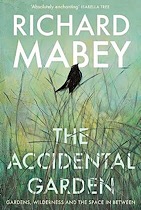‘Gardens aren’t quite like other human spaces. They’re borderlands, possessed, designed and controlled by one species, but occupied by myriads more.’
 In The Accidental Garden, pioneer of British nature writing Richard Mabey focuses a narrow lens on his own garden. It starts with a small project: Mabey decides to keep a section of his garden ‘wild’, in the sense that he aims not to plant, prune or cultivate much, just enough to give nature a little nudge. It’s a sort of experiment, both real and metaphorical, asking the question of what happens if we let nature take control – if not completely, then at least giving it agency.
In The Accidental Garden, pioneer of British nature writing Richard Mabey focuses a narrow lens on his own garden. It starts with a small project: Mabey decides to keep a section of his garden ‘wild’, in the sense that he aims not to plant, prune or cultivate much, just enough to give nature a little nudge. It’s a sort of experiment, both real and metaphorical, asking the question of what happens if we let nature take control – if not completely, then at least giving it agency.
A key point, of course, is our relationship with nature, and how the privacy of a garden – our own backyard – reflects this: Mabey gently argues against trying to reign over nature, and shows us the magical transformations that can take place if we treat it instead as an equal partner. This comparison also allows him to take a wider look at our changing planet and our global relationship with the wild (though ‘wilderness’, he argues, can be a misleading term, romantic, placing us outside the landscape when instead we need to think of ourselves as part of it).
He paints minutely observed histories of places and plants, from 17th-century enclosures through the changing existence of our beloved hedges and hedgerows to surviving wild forests and flowers. With over fifty years of experience in observing, learning and writing about the natural world, Mabey’s language flows across the page, tenderly suffusing with knowledge every point or argument. He shows vast knowledge, but also humility, in his work, here as ever: he seemingly knows every creeper, flower and weed that appears from the soil, but will almost gleefully admit to the ones he doesn’t recognise. He is gentle and curious, making this a joint exploration between writer and reader. We walk with him, hazel wand in hand, as he pokes and prods around the forest floor and grasslands, looking for new life.
It is great to see that someone like Mabey, who spent most of his life with nature, and who has observed so many of the (often devastating) changes that have taken place in our natural world, still retains optimism. He is acutely aware of the looming climate catastrophe, but instead of giving in, he extends an invitation to us all to start small.
‘The default affective state of almost all living beings is an intense attentiveness, not to the self but to the world beyond,’ he points out. ‘It might not be a bad goal for us, too.’
Any Cop?: This lyrical, essayistic book is a touching read for any naturalist, and deserves pride of place among Mabey’s many excellent works.
Vera Sugar